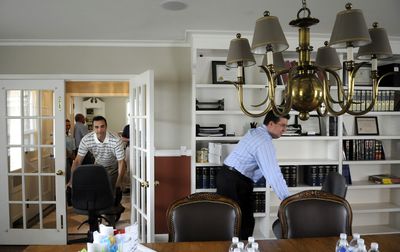Office space with a twist
Building owner embraces technology to provide unique base for businesses

Starting a business can be costly. The operating cost of running an office can be enough to discourage anyone on a budget to start a business. Owning or leasing a building can create so much overhead that a fresh business owner will see profit margins eaten away, and may even watch the operation go into the red.
Spokane attorney Patrick Fannin understood this, and he was determined to help some friends in the legal community deal with office costs and support services. He decided to create Spokane Virtual Offices (at www.LowerYourOverHead.com), a building where a group of local businesses pool resources and share the cost of operation.
Virtual offices allow business tenants to operate as though they are physically at the business center, when in fact they may be on the road or working from their basements or lounging on a patio.
The two-story brick building, at 1312 N. Monroe, was originally the residence for the first owners of the next door Hazen & Jaeger Funeral Home. Fannin bought the building a few years ago and considered using it for his legal office. But once he researched how broadband connections and office software have evolved, he decided to make the building a virtual office.
“Once I realized we could take advantage of the technology that’s out there, it became clear to me this was the better way to go,” Fannin said.
Some of his tenants never choose to come to the actual building. Others only come in for occasional visits with a customer or to use a fax machine or copier.
The key to the operation, Fannin said, is office manager Tanya Hardin. She takes incoming calls, tracks tenant locations and keeps tabs on their calendars and availability.
Hardin answers all incoming phone calls with a business greeting specific to each tenant. If the tenant is available, the caller will be transferred to that tenant’s cell phone, home phone, lake cabin or remote site.
Michael Mullin, a loan consultant with First Priority Financial, has been in Fannin’s building for almost a year. He used similar services before he moved to Spokane from Las Vegas, but he finds Spokane Virtual Office is superior because the monthly expenses are clear and easy to budget for.
In addition, he has received several compliments on how friendly, professional and helpful “his” receptionist has been when greeting clients in the office or answering the phone.
“My kids are also still home from school and they’re getting to me when I’m working at home,” Mullin said. “So I told Patrick he’ll probably see me more often the next few weeks. I need to come down here (to the Monroe address) to get work done,” Mullin said, with a laugh.
What makes this office “virtual” is the ability by each tenant to run his or her business almost entirely through an online management system. One Spokane attorney who uses the service typically works from home but decided to take some time off. After logging onto her virtual office account, she set her status as “away,” but left notes on her account which said if calls came from either of two people, the receptionist was to patch those calls to her cell phone.
The tenants also have the choice of routing all incoming calls directly to their home or cell phones, bypassing the office receptionist.
Because Fannin’s office uses a ShoreTel voice over Internet (VoIP) phone system, recorded messages from outside callers to a business can be e-mailed to the tenant and listened to over the Internet.
Tenants can also make calls to customers from their homes or a hotel on the road, using the virtual office number as the Caller ID. That system avoids revealing the actual phone number or location from which the tenant is calling, Fannin said.
Tenants like Mullin can come into the office and use one of Fannin’s conference rooms to meet with clients.
One tenant, a Spokane court reporter company, uses one of the conference areas as a deposition room if the participating attorneys in a case don’t have an office room available.
Since opening Spokane Virtual Offices in August 2007, Fannin’s group of tenants has grown to include attorneys, mortgage brokers, process servers, accountants and IT/computer specialists. Proximity to Spokane is not a critical issue; three of his tenants work from Canada and one is based in Michigan, Fannin said.
The cost of a Spokane Virtual Office varies depending on the level of service provided. A monthly package for $300 includes the basic features plus 100 photocopies, free parking and access to a network of virtual tenants – CPAs, lawyers, bookkeepers – that offer discounts on their services. Other packages range from $50 to $150 per month.